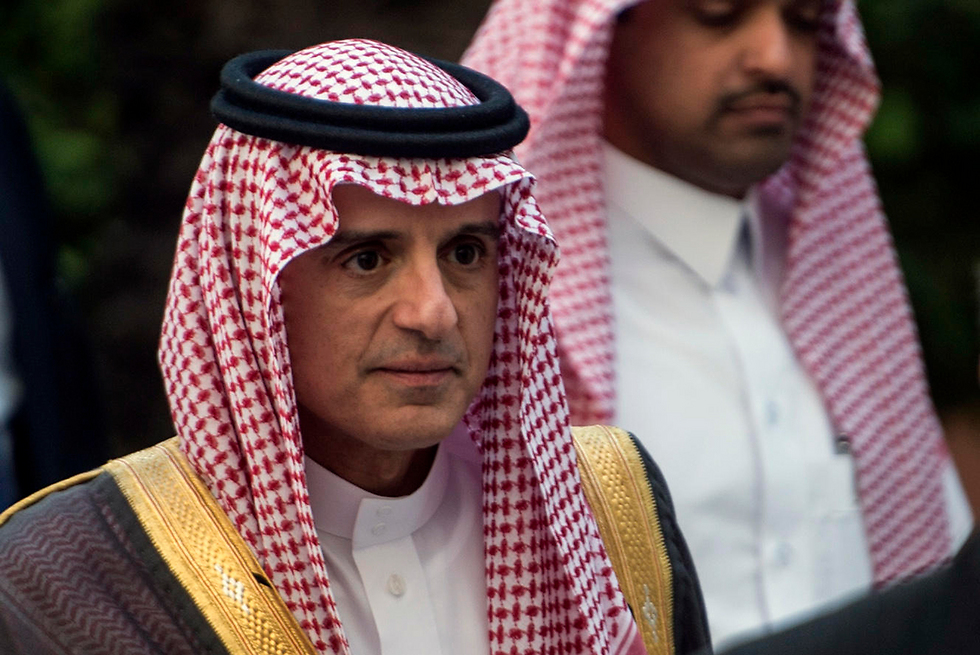
Saudi FM: normalization with Israel hinges on peace with Palestinians
Normalization between Israel and Saudi Arabia, other moderate Arab states will take hold after Israeli-Palestinian peace accord creating Palestinian state, says Saudi FM al-Jubeir, reasserting commitment to Arab peace initiative; downplaying split with Qatar over its support of Hamas, al-Jubeir says many more critical items on Saudi agenda.
Feflecting claims of a growing relationship with Israel, Saudi Arabia restated its traditional position that normalization will only be possible after an Israeli-Palestinian peace agreement is achieved.
"There are no relations between Israel and Saudi Arabia. There is only the Arab peace initative, which constitutes a roadmap to peace and for Israel normalizing its relations with Arab countries," said Saudi Minister of Foreign Affairs Adel al-Jubeir in an interview to the Egyptian CBC network on the sidelines of the Arab League's conference of foreign ministers in Cairo.
Al-Jubeir's reply came after his interviewer asked whether such a warming of relations was, in fact, taking place, considering the unprecedented interview given by IDF Chief of Staff Gadi Eisenkot to the Saudi Elaph newspaper.
In reference to the interview, Al-Jubeir was asked whether a channel for dialogue has effectively been opened between the two countries.

In the same Elaph interview, Eisenkot said Israel was willing to share its intelligence with moderate Arab states, including Saudi Arabia. As it pertains to Iran, Eisenkot said Israel and the Saudi kingdom were in "complete agreement."
"Saudi Arabia is committed to the Arab peace initiative. When (Israeli-Palestinian) peace is achieved, Israel will have normal relations with all Arab states. All Arab countries have professed their support of this notion since the 2002 Beirut Arab League summit and once again at the Amman summit at the beginning of this year," al-Jubier explained.

The Saudi minister was then confronted with reports Arab states would be willing to make the terms stipulated in the Arab peace initiative more flexible.
"The Arab terms are clear: two states, one of which is Palestinian with east Jerusalem as its capital. As for other matters, they can be agreed upon between the Israelis and Palestinians. The stance of the Arab countries has always supported their Palestinian brethren and that remains our stance," he said.
Al-Jubeir also commented on the security and political challenges facing his country, and described the Saudi scale of priorities, downplaying the importance of the split with Qatar.
"The crisis with Qatar is extremely small and should not be overstated," he said. "We have larger matters to contend with: Iran's interference in the region, the danger that country and its nuclear plans pose, its sponsorship of terrorism and its ballistic missile program."
The issue of Iraqi stability," he continued, "is also far more important than the Qatari issue. Solving the Syrian crisis is also of greater importance. Yemen, Libya, terrorism and extremism in general are all great, important matters, whereas the Qatar issue is insignificant."
Nasrallah: 'Grave step towards normalization with the enemy'
Despite the minister's proclamations, an ever-increasing deluge of reports surfaced recently alleging a tightening of relations between Israel and Saudi Arabia, in light of recent Saudi statements against Iran.

Prime Minister Benjamin Netanyahu himself said in the Knesset last week, "For obvious reasons I cannot describe everything we're doing to tighten relations with different elements in our region. Anyone can see this nearing of relations. We stand should to shoulder with moderate Arab states, whether against Iran or the Islamic State. The proximity is good for security and, in my opinion, will ultimately be good for peace."
Hezbollah Secretary General Hassan Nasrallah also commented on the irregular interview Eisenkot gave the Saudi paper. "The Saudi site's interview with chief of the staff of the enemy's army Eisenkot is an extremely grave step as it pertains to normalization with the enemy," he said.
"The Israeli statements regarding relations with Saudi Arabia and other countries are extremely harsh and relate mainly to (Palestinians). Palestinians both from the Palestinian Authority and from other factions will be subjected to American and Arab pressures to forgo their rights for what has been dubbed the 'deal of the century,'" Nasrallah continued.
The Hezbollah ledaer then called on Palestinians to rely on their unity. "If you come together, you can take on the entire world, but if you're divided, Palestine will slip right through your fingers as part of the so-called 'deal of the century,'" he cautioned.










